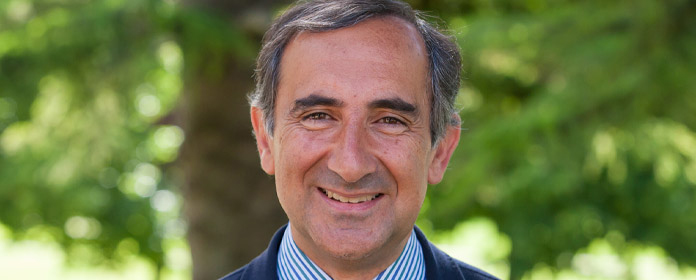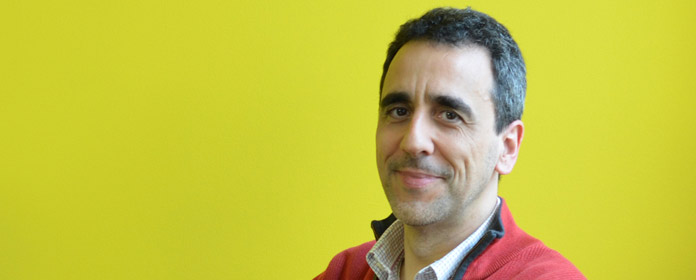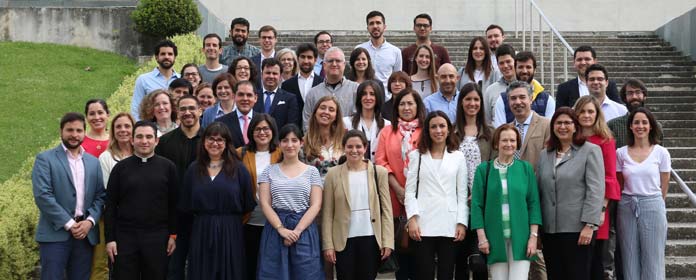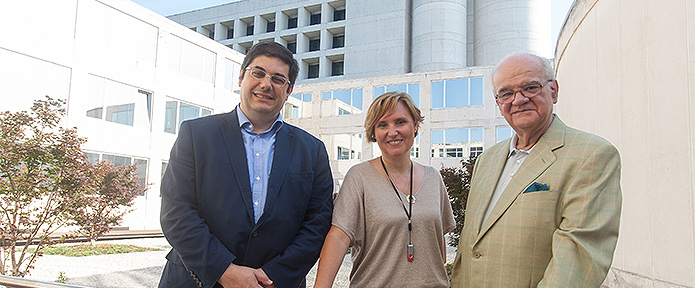A postdoc in Antwerp: Life after a PhD
Dámaso Izquierdo completed his doctorate at the Institute for Culture and Society within the Public Discourse project and recently began working at a Belgian university
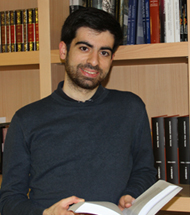
FOTO: Isabel Solana
Dámaso Izquierdo did not end up studying linguistics by chance. He acknowledges that in high school he did not know much about this discipline, but his vocation for languages— he speaks English, French and German, and Spanish— and for language in general led him to study Spanish Philology at the University of Navarra. His path was clear: "I knew a thesis was the next step. It did not take me long to make up my mind."
That was the beginning of a four-year adventure as a doctoral student within the Public Discourse project at the Institute for Culture and Society (ICS). He earned his PhD and obtained the 2016-2017 Extraordinary Doctorate Award in Humanities from the School of Humanities and Social Sciences. In it, he analyzed the scope and limits of evidentiality, a linguistic category that indicates how the speaker obtained knowledge of the information about which he speaks.
When explaining what he studies, he points to discursive questions such as its implications in the field of public discourse or the media. "When a journalist covers a case and talks about aspects that have not yet been confirmed, he handles many sources and assigns them different information. But he cannot continuously repeat, “according to the source...” so he introduces variations that place forthcoming information intothis sphere of discourse,"he specifies.
Research stays in Belgium, Germany and the United KingdomHe admits that when he started his doctorate he had no idea what a researcher actually does. "I think almost no one knows at first; you only realize when you are fully involved," he says. "In the beginning, it is very rewarding because you get to read a wide variety of bibliography. But soon it's time to write, which involves organizing a long and varied text... It is completely different from anything you’ve done before," he says. He says he has gone through "ups and downs," but doesn’t regret anything after reaching the end.
To be exact, it is not about an end; when this first stage ends, the true life of every researcher begins. Izquierdo’s defense was followed by a year of research at ICS- and his first publications as a doctor- which next brought a year as a professor-tutor at a UNED associated center in Pamplona.
In April 2018, Izquierdo made the leap to an international postdoc within the Department of Linguistics of the University of Antwerp (Belgium) with Patrick Dendale as his supervisor. It is his third research stay at this university, although this time for longer than the previous ones. He has also undertaken research stays at the Universities of Heidelberg (Germany) and Lancaster (United Kingdom).
At the University of Antwerp, he aims to edit and compile a variety of articles from his doctoral thesis and send them to prestigious international journals. "I want to build my skill by publishing in English because I know that during my career I will have to publish mainly in this language," he adds. With these publications, he wants to continue deepening his expertise in his field, within which he has just published a new book, together with Professor Bert Cornillie, entitled Gramática, semántica y pragmática de la evidencialidad (EUNSA).
In addition, he plans to continue collaborating with an ICS project, “The DEMOS in the imaginary of new politics,” financed by the Spanish Ministry of Economics and Competitiveness. He is excited to continue collaborating with the Institute: "What I value most about ICS is its interdisciplinarity. I take with them this way of working as a team, whichis not very frequent at other centers,"he says.
He knows that this stage has other and new challenges like seeking financing, applying for projects, or renouncing stability for a while... However, he trusts that he will enjoy the positive things it offers: "A research stay is an opportunity to learn, to get out of one’s routine for a while and to absorb what is happening elsewhere."


